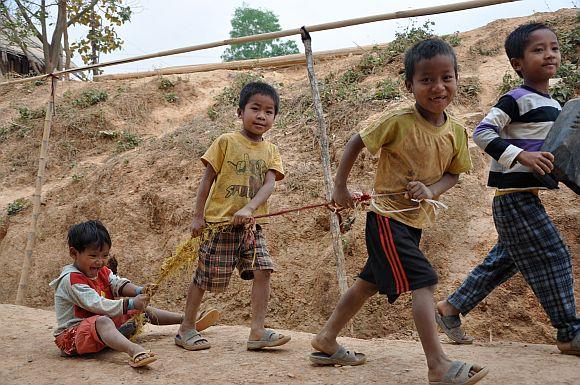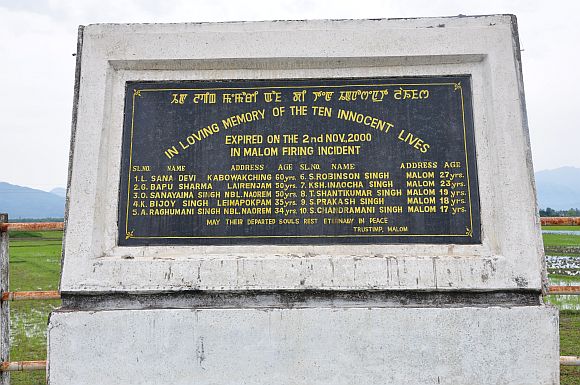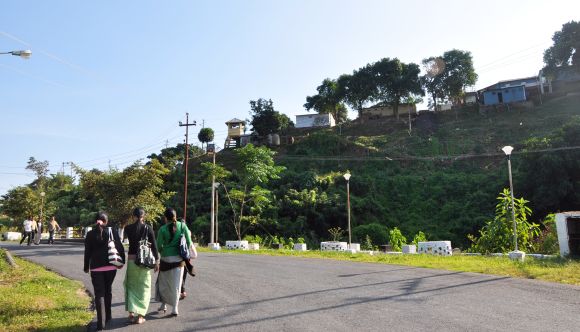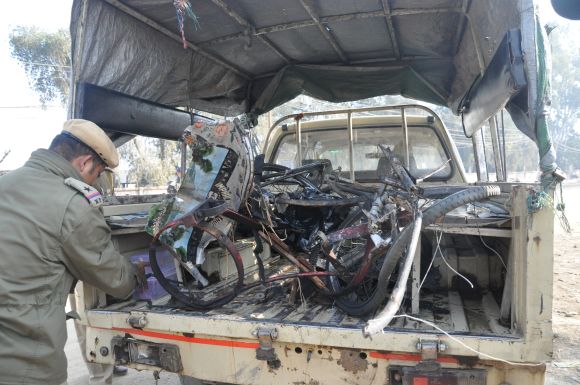 | « Back to article | Print this article |
Fear and laughter in Manipur
The India-Myanmar border state of Manipur blips on the national radar only if there is a big militancy-related incident or, as it was till November 29, it is under an economic blockade lasting over four months. Sumit Bhattacharya travelled to the state to understand what ails it, and found guns, shocking truths, music and humour.
This is the second part of a series on Manipur.
Read Part 1: Why you haven't heard the last of the Manipur blockade
"Manipur bahut danger jaga hai bhai (Manipur is a dangerous place, brother)," says a friend you have not met for 11 years, as you bump into him on the nine-hour Mumbai-Kolkata-Guwahati-Imphal journey. "If we give an opinion, we will be killed," adds the longtime Imphal resident.
As you land at Imphal airport -- after ogling at Mt Everest and Kanchenjunga from the flight window between Kolkata and Guwahati -- you wonder why.
Then you open the Imphal Free Press newspaper, and you read.
On November 26, Brigadier Vineet Kumar of the paramilitary Assam Rifles tendered a public apology to the village of Khurkhul and the family of Nando Singh, who died in Assam Rifles custody.
The village has refused to take over the body of Singh, 35, till the family gets compensation, his wife gets a job, and an Assam Rifles post near the village is shifted out. Singh had been picked up a day earlier for questioning.
You close the newspaper after you see the photograph of Singh's wife lying in the middle of a rectangle of people. She had fainted on hearing of her husband's death.
"It was a simple case of moneylending," says someone in the know, a day later. "With militancy on the wane, the security forces in their machismo get embroiled in local petty issues."
It's not really an aberration in a state where everyone seems afraid. Where UG is for underground militant groups. Where even government servants -- some say most, others say some -- have to pay a fixed percentage of their salaries to such groups.
A state where no Bollywood movie has played in a theatre for the last 11 years because of a militants' diktat against Hindi films.
Please click NEXT to read further...
'AFSPA is an infectious disease'
"We have become more or less acclimatised to the climate of fear," says Irengbam Arun, editor of the Manipuri daily Ireibak. "The oppressive heat generated by the armed forces under the Armed Forces Special Powers Act and the excesses of the police commandos. People have begun to think that this is supposed to be the normal condition. Normal and dismal. It has come to that stage."
The AFSPA gives the Central armed forces sweeping powers, including shooting on mere suspicion, detention without warrant, etc.
In the Malom incident in 2000, that sparked Irom Sharmila's decision to fast till the AFSPA is repealed, one of the 10 people killed was a young man who had won the National Bravery Award.
"The AFSPA is an infectious disease," says Arun. "It infects not only the armed forces but also the police, who do not have the powers of the AFSPA. They begin to think, if the army can operate with impunity, why not we? That mindset led to fake encounters."
Manipur is notorious for fake encounters, though everyone agrees they are on the decline since the July 23, 2009 incident. Before that -- it blipped on the national radar because a national weekly, Tehelka, exposed the lie with photographs -- people say there would be killings every week.
"The entire climate of impunity has infiltrated everywhere," agrees Pradeep Phanjoubam, editor of the Imphal Free Press. "The police, although not covered by the AFSPA, are following the same behaviour."
'You are busting so many camps and you never catch money?'
The AFSPA, Phanjoubam points out, was imposed in 1958.
"India at that time was very very nascent. It had just seen partition, and India was very insecure," he says. "But again, there were vested interests coming in so you are simply unable to remove that even after the use of that particular act is no more valid. A commission headed by a Supreme Court judge recommended that this act should be removed but it's still not done because of the vested interests which have developed. Because you have something, it will have its own logic, logic which may not be in touch with the actual ground situation but supported by those vested interests."
What are those vested interests?
"Just have a look at whenever a big militant camp is raided and busted," Phanjoubam says. "In the seizure memo -- of things that you find in that camp -- you'll find toothbrush, cooking utensils, bedcover, everything, but never money! You hear so much about extortions, in a year they (militants) are collecting Rs 100 crore, where does that money go? You are busting so many camps and you never catch money? They cannot keep that money in the bank. They will be keeping it under their pillows, or suitcases."
"Those suitcases are never found," he adds, breaking into a hearty laugh. "In business areas, you will catch those guys with demand letters. What about the demanded stuff? You never find that! So you find all these palaces coming up, and most of them belong to the police."
Phanjoubam also says that for the Indian Army, the northeast is a ready training ground.
"This is a low-intensity conflict," he says. "For the army it's not the only thing but it's one of them -- it's a good training ground. It's a war that they cannot lose. And it's a war that'll keep your soldiers fit and battle ready."
Rs 15 lakh to become a police officer
Manipur is also a land of open secrets. One of them is that government jobs -- the only ready employment opportunity in the state -- come with a price tag.
Many people sell off ancestral property for such jobs, as Irom Sharmila pointed out in her appeal to the public that Rediff.com was the first to publish.
The going rate for becoming an assistant sub inspector of police is Rs 1.5 million.
"So you have to recover the investment," explains Phanjoubam. "One way is what I told you (money from militants). Another way is, you catch somebody. That somebody will want to be released and will also not want it to be known that he was ever arrested. So they will drop all the charges and release you, for a price. Especially if you are a government officer. Maybe you were caught for something very unintentional, like you were sitting with a guy who is involved in underground activities so you were caught along with him. You will want to be quickly released, otherwise it can cause lots of complications. So rather than lose your job you'll pay Rs 3 lakhs to get yourself released. So that kind of money suddenly turns black."
'AFSPA, why don't you go f**k yourself'
The general hatred -- there is no other word for it -- for the Armed Forces Special Powers Act has filtered into art as well.
'AFSPA, why don't you go fk yourself,' sings Ronid Chingangbam -- with a distinct Bob Dylan drawl -- on his song called AFSPA.
The chorus goes: 'Tiddim Road is still bloody/The air smells gunpowder/From my window I can see only widows/And Mama don't want me to sing such song/So leave, leave, leave/AFSPA why dont you go fk yourself.'
Tiddim Road is the road from Imphal to Myanmar on which the Malom incident happened.
Ronid, Akhu to friends, is a PhD student in physics in New Delhi. He left Imphal after his Class XII.
"Since my childhood days in school we have known it as a draconian act," he says, when you ask him why he wrote AFSPA.
He performed with his band, Imphal Talkies N The Howlers, at a big music festival in Pune called NH7 recently.
Have people ever taken umbrage at his songs?
"No, but people have come up to me to tell me: You are lucky that the crowd listened to you silently, they could have beaten you up!"
Many of his songs ask India hard questions. (His song called India, I see blood in your hands asks: India, why are your farmers so fking suicidal?) How would he react if someone called him anti-national?
"We have been treated like we are not part of this country," he replies.
'Militancy is on the wane. They are desperate'
Things are looking up in Manipur, some say.
"The security forces cannot kill people with impunity -- as they were doing," says human rights activist Babloo Loitongbam. Militancy, he asserts, "is definitely on the wane."
The people, he adds, understand that "just because you have a gun doesn't mean you can ask for the moon. The world is much bigger."
Phanjoubam agrees: "Militancy is on the wane. They are desperate. Some of their top leaders have been caught and also they are losing public sympathy. As long as public sympathy was there they could move around, but now that thing is no more there -- not as much as it used to be. People are looking for jobs, career, studies. And they are finding it increasingly difficult to find recruits, that's why they are recruiting children."
But there still are a lot of guns in Manipur. It is not difficult to find families that keep guns -- some licensed, some unlicensed -- to feel safe.
"Just because you met some people with guns, I don't think you can generalise like that," says Phanjoubam.
Others point out that the line between militants and the armed forces has blurred. You are told stories of how and when a man claiming to be an underground operative went to extort money from a school, he was overpowered. Turned out, he was a man of uniform.
Even in the cut-from-salary for government servants -- another one of Manipur's open secrets -- no one really knows where the money is going.
In some cases it has been found that the office clerk, to whom everybody's cuts go for being sent in cash to the underground groups, was pocketing the money.
'Just one line by Sibal making us angry. Imagine Manipur'
In the year 2000, after declaring that Bollywood movies will not be allowed to be screened in the state, the militants issued a diktat declaring women will not be allowed to wear 'Indian dresses' like salwar kameez.
Chitra Ahanthem, an anti-AIDS activist who is now also a mother, wrote a column in the Imphal Free Press declaring that she would make it her duty to wear such dresses.
An armed man went to the office of the NGO she worked in, looking for her. She was not there.
She wrote another column, saying that sorry she was not in office, could the militant please come again?
"He did not come," she says, laughing rather like Salman Khan in Dabangg.
She is, however, an aberration. Everyone else in Imphal tells you to be very careful and to ensure you are back in the hotel room before dark (5 pm, in this eastern tip of India).
Three days later after you landed in this strange, beautiful land, you stand before the mangled remains of what was a cycle rickshaw.
Its driver was ferrying an improvised explosive device to the state tourism department's Sangai Festival, which was filled with thousands of people every day.
It blipped on the national radar because the bomb went off two days before Prime Minister Manmohan Singh and his party chief Sonia Gandhi's arrival.
But you will not find any mention of the Brigadier Kumar incident on the World Wide Web except in one Manipur-centric Web site.
And as you return to the comfort of Mumbai, you open your Twitter page. Someone has written: 'Just one line by (Kapil) Sibal (about monitoring Internet content) itself is making us so angry means imagine how it must be in AFSPA areas like Manipur no?'
Watch out for the next part of the series: What is Manipur's future?
Check out our other top slideshows
 | 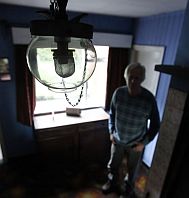 | 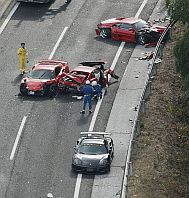 |
| A second earth in our galaxy | 29 years without electricity | World's costliest car crash |
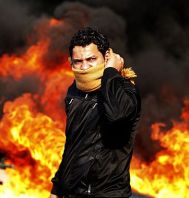 | 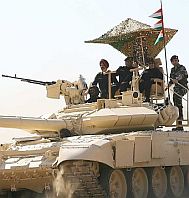 |  |
| PHOTOS of the YEAR - I | Pratibha Patil rides the T-90 | The NEW Iraq |
